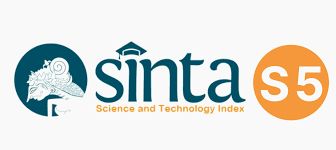Edu-Tourism Through Digital Literacy Based on Science and Technology in Community Empowerment Efforts to Improve the Economy in Banyuwangi Regency
DOI:
https://doi.org/10.25170/metris.v25i02.5423Keywords:
Community, Edu-Tourism, science, TechnologyAbstract
This research aims to explore the role of science and technology-based edutourism in community empowerment efforts for economic improvement in Banyuwangi Regency, East Java. The subject matter studied includes the impact of the application of science and technology in edu-tourism programs on community economic improvement, strengthening the quality of education, and
preserving local culture, improving the quality of human resources, utilizing technology in edu-tourism, and its impact on local economic development. The research method used was a literature study, as well as field research to collect relevant qualitative data. The data used includes data on the economy, education, tourism, and science and technology innovation in the education and tourism sectors. Based on the data analysis, this study highlights the importance of utilizing science and technology in the development of edu-tourism programs as an effort to improve the quality of the tourist experience, empower local communities, and strengthen the regional economy. The conclusion of this study shows that the implementation of science and technology-based edu-tourism has great potential to be one of the effective strategies in the effort to empower the community and improve the economy in Banyuwangi Regency. It is hoped that the results of this research can provide input for the government, educational institutions and tourism actors to develop edu-tourism programs in the form of sustainable digital modules and based on website technology to support economic and social development in Banyuwangi Regency.
References
Afrianto, Y. A. (2024). Implementing Rapid Application Development (RAD) for Statistical Analysis of Tourism and Travel Vlog Content. Journal of Information System Research (JOSH), 5(2): 572. https://doi.org/10.47065/josh.v5i2.4787
Banyuwangi Regency Tourism and Culture Office. (2022). Tourist Visit Data.
Central Bureau of Statistics. (2022). Banyuwangi Economic Growth 2021.
Demak Tourism Department. (2021). Terms of Reference (TOR).
Employment Agencies. (2021). Employment in 2021 Data. (https://satudata.kemnaker.go.id). Diakses tanggal 7 Juni 2024.
Hairunisya, N., Anggreini, D., & Sri, M. A. (2020). Pemberdayaan di Sektor Pariwisata Sebagai Upaya Meningkatkan Perekonomian Masyarakat. Jurnal Pengabdian Kepada Masyrakat, 26(4): 241-247. https://doi.org/10.24114/jpkm.v26i4.20646
Hateftabar, F., & Chapuis, J. M. (2020). The influence of theocratic rule and political turmoil on tourists’ length of stay. Journal of Vacation Marketing, 26(4): 427–441. https://doi.org/10.1177/1356766720943624
Head of Bekasi City Education Department. (2020). Guidelines for organizing Study Tours in Elementary Schools and Junior High Schools.
Ikrom, Z., Raihanah, Y. N., Annisa, S. H., & Andhika, R. F. (2022). Mengenal Lebih dalam Komunikasi Lintas Budaya di Era 5.0. Insan Cendekia Mandiri.
Islamiah, K., Anwar, R., & Damayanti, V. D. (2020). Rencana Lanskap Wisata Edukasi Kebun Anggrek Di Taman Kyai Langgeng Kota Magelang. Langkau Betang: Jurnal Arsitektur, 7(1): 85. https://doi.org/10.26418/lantang.v7i1.35002
Kementerian Perencanaan Pembangunan Nasional. (2022). Peta Jalan Sustainable Development Goals (SDGs) di Indonesia.
Lai, K., & Li, X. (Robert). (2016). Tourism Destination Image: Conceptual Problems and Definitional Solutions. Journal of Travel Research, 55(8): 1065–1080. https://doi.org/10.1177/0047287515619693
Laporan Dunia UNESCO. (2019). Berinvestasi dalam Keanekaragaman Budaya dan Dialog Antarbudaya.
León-Gómez, A., Ruiz-Palomo, D., FernándezGámez, M. A., & García-Revilla, M. R. (2021). Sustainable tourism development and economic growth: Bibliometric review and analysis. Sustainability (Switzerland), 13(4): 1–20. https://doi.org/10.3390/su13042270
Muler Gonzalez, V., Coromina, L., & Galí, N. (2018). Overtourism: residents’ perceptions of tourism impact as an indicator of resident social carrying capacity - case study of a Spanish heritage town. Tourism Review, 73(3): 277-296. https://doi.org/10.1108/TR-08-2017-0138
Ndou, V., Mele, G., & Del Vecchio, P. (2019). Entrepreneurship education in tourism: An investigation among European Universities.
Journal of Hospitality, Leisure, Sport and Tourism Education, 25 (100175): 1-11. https://doi.org/10.1016/j.jhlste.2018.10.003
Persada, S. F., Prasetyo, Y. T., Maharani, I. G. A. P., Apriyansyah, B., Ong, A. K. S., Young, M. N., Nadlifatin, R., Setiyati, E. A., Shanti, M., Kumalasari, R. D., Ubud, S., Putra, R. A. K., Putri, H. H. K., Gunawan, G. A., Wijaya, I. B. A., Zunaidah, A., Putri, G. S., Prisca, Y., Redi, A. A. N. P., & Razif, M. (2023). How Tourists Reacted to Ecotourism during COVID-19: Insights on Its Sustainability from a Multivariate Analysis Based on the Case of Banyuwangi. Sustainability (Switzerland), 15(2): 1-23.https://doi.org/10.3390/su15021440
Regent of Banyuwangi Regency. (2022). Establishment of a Forum for Regional Disaster Risk Reduction in Banyuwangi District Period 2022 - 2025.
Streimikiene, D., Svagzdiene, B., Jasinskas, E., & Simanavicius, A. (2021). Sustainable tourism development and competitiveness: The systematic literature review. In Sustainable Development (Vol. 29, Issue 1, pp. 259–271). John Wiley and Sons Ltd. https://doi.org/10.1002/sd.2133
Velempini, K., & Martin, B. (2019). Placebased education as a framework for tourism education in secondary schools: A case study
from the Okavango Delta in Southern Africa. Journal of Hospitality, Leisure, Sport and Tourism Education, 25(100197): 1-10. https://doi.org/10.1016/j.jhlste.2019.100197 (
Wijaya, N. S., Arcana, K. T. P., & Sudarmawan, I. W. E. (2020). The Role of Tourism Destination and Human Resources in Sustainable Tourism Implementation in Indonesia. Journal of Business on Hospitality and Tourism, 6(2): 347–357
Yirci, R., Karakose, T., Kocabas, I., Tülübaş, T., & Papadakis, S. (2023). A Bibliometric Review of the Knowledge Base on Mentoring for the Professional Development of School Administrators. Sustainability (Switzerland), 15(4): 2-25. https://doi.org/10.3390/su15043027












